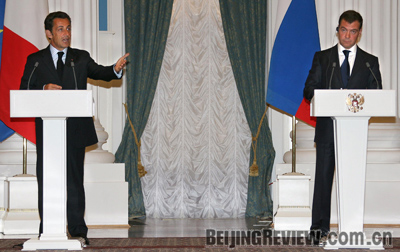|

CALL FOR PEACE: Russian President Dmitry Medvedev and French President Nicolas
Sarkozy appear at a joint press conference on August 12 in Moscow. The conflict ended when
Russia and Georgia accepted Sarkozy’s six-point ceasefire agreement.
Although Medvedev declared as "irreversible" Russia's decision to recognize the two breakaway republics' independence, he exhibited some flexibility and openness. He said that Russia's future diplomatic relations would depend not only on Russia, but also on its friends and partners in the international community. The president also said that although Russia does not support diplomatic or economic sanctions in general, the government could adopt the special laws necessary to impose them on other countries.
A balance between principle and interest
The five principles represent Russia's response to U.S.-led NATO enlargement, which is creeping ever closer to its borders. Through these principles, Russia hopes to strike a balance between observing basic principles of international law and protecting its own interests.
Medvedev said it was Georgia that initiated the South Ossetia conflict, which killed at least 2,000, displaced more than 158,000 and caused extensive building damage. Russia's only aim, he said, was to halt the violence, protect civilians and restore peace as soon as possible. Earlier this year, Russia supported a UN Security Council resolution reaffirming Georgia's sovereignty and territorial integrity. In a news conference on August 26, Vitaly Churkin, Permanent Representative of the Russian Federation to the UN, said that Georgia's attack on South Ossetia had created a "new reality," negating the UN resolution. Given this new reality, Russian leaders concluded they had no choice but to intervene.
Medvedev's five principles should be viewed in the context of American unilateralism and the two rounds of NATO enlargement. The honeymoon the United States and Russia enjoyed after the Cold War was brief. Since then they have alternated between cooperation and confrontation, with conflicting strategic interests underlying most disputes.
Chief among these disputes is the U.S.-driven NATO enlargement, which has also contributed to the conflict between Russia and Georgia. Aside from its geostrategic value, Georgia is a key energy route. In 2005, Georgia opened a U.S.-backed oil pipeline that can pump more than 1 million barrels of crude oil per day, bypassing Russia completely. These perceived assaults on Russian security are a major factor in its foreign policy.
NATO's second enlargement in 2004-which included the Baltic states-put NATO fighter aircraft at Russia's northwest gate. The following year Saakashvili enraged Russia by seeking NATO membership. Russia uses its influence in South Ossetia and Abkhazia to slow down Georgia's pace.
During Putin's presidency, Russia's political situation stabilized, its economy recovered, and it paid off its debt to the Paris Club thanks to a U.S. dollar reserve swollen by rising oil prices. Russia now has the economic strength and military power necessary to stand up to the West, which has not gone unnoticed. At the April 2008 NATO summit in Bucharest, the alliance decided not to offer Georgia a Membership Action Plan, which is required for countries seeking membership, but assured Georgia in a special communique that its membership would eventually be approved.
| 